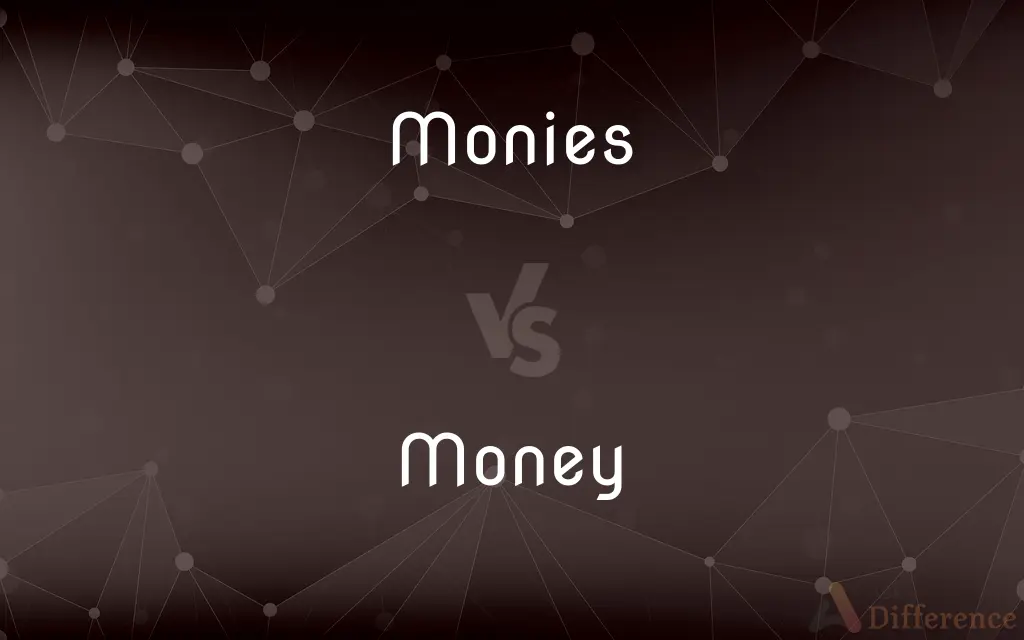Monies vs. Money — What's the Difference?
By Tayyaba Rehman & Maham Liaqat — Updated on April 3, 2024
"Monies" refers to sums of money from different sources or of different types, emphasizing variety or distinction, while "money" is a singular term focusing on currency as a medium of exchange, store of value, or unit of account.

Difference Between Monies and Money
Table of Contents
ADVERTISEMENT
Key Differences
"Monies" is often used in legal and financial contexts to refer to separate sums of money that are from different sources or allocated for different purposes. It highlights the diversity or the categorization of funds within a larger context. On the other hand, "money" is a more general term that refers to any currency, whether in the form of coins, banknotes, or digital currency, used to purchase goods, services, and settle debts.
While "monies" can imply a more formal or technical discussion about finances, focusing on the specifics of financial management, allocations, or transactions, "money" is universally understood and used in everyday language to discuss anything related to financial resources or economic value without the need for specificity or distinction between sources or types.
The use of "monies" suggests a multiplicity and often a legal or formal context where funds are distinguished by their source, purpose, or allocation. Whereas "money," without specifying plurality, can refer to an unspecified amount of currency in any form, focusing on the concept or medium rather than the specifics or categories of the funds.
In legal documents or financial reports, "monies" is deliberately chosen to emphasize the separation, management, or earmarking of funds for specific uses or origins, underscoring the legal or financial responsibilities associated with these funds. In contrast, "money" might be used in more general statements or discussions where the emphasis is on monetary transactions or holdings without the need for such distinctions.
The choice between "monies" and "money" can also reflect the speaker's or writer's intent to either draw attention to the complexities and specifics of financial management ("monies") or to speak in broader terms about economic resources or transactions ("money"), indicating a strategic use of language to convey specific nuances.
ADVERTISEMENT
Comparison Chart
Definition
Refers to separate sums of money from different sources or allocated for different purposes.
Refers to any currency used to purchase goods, services, and settle debts.
Context
Often used in legal, financial, and formal contexts.
Used in both everyday language and formal discussions.
Implication
Implies a focus on the distinction, management, or allocation of funds.
Focuses on the concept of currency and economic transactions in general.
Plurality
Highlights multiple sources or types of funds.
Generally refers to money as a singular concept.
Example Use
"The agreement outlines how the monies from the sale will be distributed among the stakeholders."
"I need to withdraw some money from the bank for groceries."
Compare with Definitions
Monies
Sums of money collected from different sources.
The monies raised from the fundraiser exceeded expectations.
Money
Currency used to measure value in transactions.
The price in money for that car seems reasonable.
Monies
Financial assets in various forms from distinct origins.
The company's monies include investments, cash, and receivables.
Money
Concept encompassing wealth and financial resources.
Making money is his main goal in life.
Monies
Separate amounts of money earmarked for different uses.
The budget detailed how monies would be allocated across departments.
Money
Medium of exchange in the form of coins and banknotes.
I need to save some money for my upcoming trip.
Monies
Funds allocated for specific purposes.
The charity allocated the donated monies to various relief efforts.
Money
Resources available for spending or saving.
He invested his money in stocks and bonds.
Monies
Legal or formal term for financial resources.
The contract specifies the handling of monies owed to the contractor.
Money
Assets with liquid value.
She keeps her money in a savings account for security.
Monies
A plural of money.
Money
Money is any item or verifiable record that is generally accepted as payment for goods and services and repayment of debts, such as taxes, in a particular country or socio-economic context. The main functions of money are distinguished as: a medium of exchange, a unit of account, a store of value and sometimes, a standard of deferred payment.
Monies
A money
Money
A medium that can be exchanged for goods and services and is used as a measure of their values on the market, including among its forms a commodity such as gold, an officially issued coin or note, or a deposit in a checking account or other readily liquefiable account.
Monies
Plural of mony
Money
The official currency, coins, and negotiable paper notes issued by a government.
Money
Assets and property considered in terms of monetary value; wealth.
Money
Pecuniary profit or loss
He made money on the sale of his properties.
Money
One's salary; pay
It was a terrible job, but the money was good.
Money
An amount of cash or credit
Raised the money for the new playground.
Money
Often moneys, monies Sums of money, especially of a specified nature
State tax moneys.
Monies set aside for research and development.
Money
A wealthy person, family, or group
To come from old money.
To marry into money.
Money
A legally or socially binding conceptual contract of entitlement to wealth, void of intrinsic value, payable for all debts and taxes, and regulated in supply.
Money
A generally accepted means of exchange and measure of value.
I cannot take money, that I did not work for.
Before colonial times cowry shells imported from Mauritius were used as money in Western Africa.
Money
A currency maintained by a state or other entity which can guarantee its value (such as a monetary union).
Money supply;
Money market
Money
Hard cash in the form of banknotes and coins, as opposed to cheques/checks, credit cards, or credit more generally.
Money
The total value of liquid assets available for an individual or other economic unit, such as cash and bank deposits.
Money
Wealth; a person, family or class that possesses wealth
Money
An item of value between two or more parties used for the exchange of goods or services.
Money
A person who funds an operation.
Money
A piece of metal, as gold, silver, copper, etc., coined, or stamped, and issued by the sovereign authority as a medium of exchange in financial transactions between citizens and with government; also, any number of such pieces; coin.
To prevent such abuses, . . . it has been found necessary . . . to affix a public stamp upon certain quantities of such particular metals, as were in those countries commonly made use of to purchase goods. Hence the origin of coined money, and of those public offices called mints.
Money
Any written or stamped promise, certificate, or order, as a government note, a bank note, a certificate of deposit, etc., which is payable in standard coined money and is lawfully current in lieu of it; in a comprehensive sense, any currency usually and lawfully employed in buying and selling.
Money
Any article used as a medium of payment in financial transactions, such as checks drawn on checking accounts.
Money
Any form of wealth which affects a person's propensity to spend, such as checking accounts or time deposits in banks, credit accounts, letters of credit, etc. Various aggregates of money in different forms are given different names, such as M-1, the total sum of all currency in circulation plus all money in demand deposit accounts (checking accounts).
Money
In general, wealth; property; as, he has much money in land, or in stocks; to make, or lose, money.
The love of money is a root of all kinds of evil.
Money
To supply with money.
Money
The most common medium of exchange; functions as legal tender;
We tried to collect the money he owed us
Money
Wealth reckoned in terms of money;
All his money is in real estate
Money
The official currency issued by a government or national bank;
He changed his money into francs
Common Curiosities
Can the term "monies" be used in everyday conversation?
Yes, but it's more commonly found in formal, legal, or financial contexts due to its emphasis on distinction and allocation of funds.
Can money and monies be used interchangeably?
Not exactly. While they relate to financial resources, "monies" specifically emphasizes distinctions between funds, whereas "money" is a more general term.
Why is "monies" used in legal documents?
"Monies" is used to highlight the differentiation, management, or earmarking of funds, which is often crucial in legal and financial contexts.
How do banks use the term "monies"?
Banks and financial institutions may use "monies" to discuss funds related to specific accounts, transactions, or allocations, emphasizing the management and differentiation of these funds.
What is the main difference between monies and money?
Monies refer to separate sums of money from different sources or for different purposes, emphasizing distinction and allocation, while money is a general term for currency used in transactions.
Is "money" always singular?
While "money" is typically used as an uncountable noun and hence singular, it refers to the concept of currency in any amount or form.
What does it mean when someone refers to "collecting monies"?
It refers to gathering funds from different sources, often for a specific purpose, with an emphasis on the diverse origins or intended uses of those funds.
Does the distinction between monies and money matter in accounting?
Yes, in accounting, distinguishing between "monies" can be important for budgeting, reporting, and financial management purposes.
How do courts view the term "monies"?
Courts view "monies" as referring to distinct sums of money that may be subject to legal action or considerations, such as in settlements or financial disputes.
What is the importance of distinguishing between money and monies?
Distinguishing between the two helps clarify whether the discussion is about financial resources in general or about specific, categorized funds.
Is there a plural form of "money"?
In general English usage, "money" is considered uncountable and does not have a plural form, but "monies" serves a similar function in specific contexts.
Can "monies" refer to digital currency?
Yes, "monies" can include digital currency when discussing funds from different sources or allocated for different uses, reflecting the broadening definition of financial resources.
How does the concept of "monies" affect financial planning?
In financial planning, "monies" emphasizes the need for detailed management and allocation of funds across various categories or purposes.
Are "monies" and "funds" interchangeable?
While closely related, "monies" often refers more specifically to the legal or formal aspects of financial resources, whereas "funds" is a broader term that can also imply the same.
What is an example of money used in a sentence?
"Saving money is essential for financial security and future investments."
Share Your Discovery

Previous Comparison
Pangasinan vs. Tagalog
Next Comparison
Object vs. ObjectionAuthor Spotlight
Written by
Tayyaba RehmanTayyaba Rehman is a distinguished writer, currently serving as a primary contributor to askdifference.com. As a researcher in semantics and etymology, Tayyaba's passion for the complexity of languages and their distinctions has found a perfect home on the platform. Tayyaba delves into the intricacies of language, distinguishing between commonly confused words and phrases, thereby providing clarity for readers worldwide.
Co-written by
Maham Liaqat













































